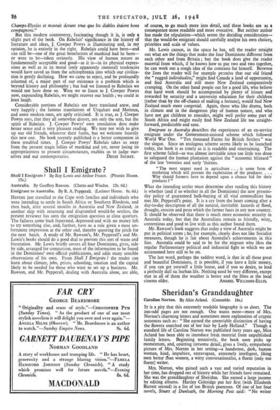Shall I Emigrate ?
HAVING just travelled to the Cape with families and individuals who were intending to settle in South Africa or Southern Rhodesia, and then back, after several months in Australia and New Zealand, in another ship with returning and disgruntled would-be settlers, the present reviewer has seen the emigration question at close quarters. The failures come back frustrated, depressed and with no money left to try something else, and, further, have as a rule given a most un- fortunate impression at the other end, thereby queering the pitch for the next batch. A study of Mr. Rawson's, Mr. Pepperall's and Mr. . Lewis's books should do a good deal to prevent this sort of waste and frustration. Mr. Lewis briefly covers all four Dominions, gives, side by side, arranged for comparison, most of the information to be found in the Dominions' own official publications, and adds many sensible observations of his own. FrOIII Shall I Emigrate ? the reader can learn about climate, jobs, prices, schooling, taxation and the capital likely to be needed for those who want to set up a business. Mr. Rawson, and Mr. Pepperall, dealing with Australia alone, are able, of course, to go much more into detail, and these books are as a consequence more readable and more evocative. But neither author has made the stipulation—which seems the deciding consideration— that the would-be emigrant should carefully analyse his own choices, priorities and scale of values.
Mr. Lewis cannot, in the space he has, tell the reader straight out what are the things that make. the four Dominions different from each other and from Britain ; but the book does give the reader material from which, if he knows how to put two and two together, he can work out a rough idea of the contrasts for himself. Between the lines the reader will for example perceive that our old friend the "rugged individualist," might find Canada a land of opportunity, and find Australia and still more New Zealand comparatively cramping. On the other hand people out for a good life, who believe that hard work should be accompanied by plenty of leisure and rewarded by security and a university education for their children (rather than by the off-chance of making a fortune), would find New Zealand much more congenial. Again, those who like drama, both in climate and in the dangerous play of human nature, and who have not got children to consider, might well prefer sonic part of South Africa and might easily find New Zealand life too straight- forward, predictable and sane.
Emigrant to Australia *scribes the experiences of an ex-service emigrant under the Government-assisted scheme which followed World War One. "Ten thousand Farms for British Settlers" was the slogan. Since an analagous scheme seems likely to be launched today, the book is as timely as it is readable and entertaining. The first scheme failed—as was almost inevitable since too little was done to safeguard the human plantation against the "economic blizzard" of the late 'twenties and early 'thirties.
"The most urgent need in agriculture . . . is some form of marketing which will prevent the exploitation of the producer. . . . Why should farmers have to depend upon a chance bid for their products ? "
What the intending settler must determine after reading this history is whether (and if so whether in all the Dominions) the new present- day policy of guaranteed bulk-buying of all vital commoaitks has met Mr. Pepperall's point. It is a cry from the heart coming after a day-to-day description of all the natural, inevitable hazards of flood, drought, erosion and pests which the farmer faces in any new country.. It should be observed that there is much more economic security in Australia today, but that the Australians remain as friendly, witty, contentious and good to live with as this author found them. -
Mr. Rawson's book suggests that today a view of Australia might be put in political terms ; he, ',for example, clearly does not like Socialist measures, though he is fair about Australia's achievements in this line. Australia could be said to be for the migrant who likes the regular Parliamentary political and industrial fight to which we are accustomed here still to be on.
The last word, perhaps the saddest word, is that in all those great and beautiful Dominions, it is possible, if you have a little money, if you can get yourself a little house, and if you so desire, to lead a perfectly dull six. burban life. Nothing need be very different, except that in all of them the weather is better and the films at the local


































 Previous page
Previous page